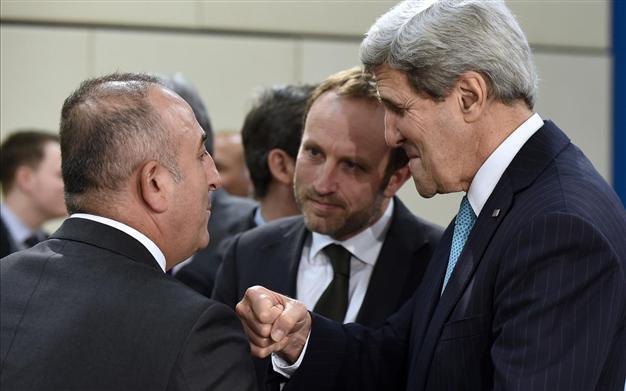Turkey and US 'converge' on Syria: FM Çavuşoğlu
Sevil Erkuş BRUSSELS

US Secretary of State John Kerry (R) speaks with Turkish Foreign Minister Mevlüt Çavuşoğlu (L) and Danish Foreign Minister Martin Lidegaard during a NATO foreign ministers meeting at the NATO headquarters in Brussels on Dec. 2. AP Photo
A considerable convergence between Turkey and the United States has emerged during recent talks concerning the U.S.-led coalition’s fight against the Islamic State of Iraq and the Levant (ISIL) in Syria, Turkish Foreign Minister Mevlüt Çavuşoğlu has said.“I can say, particularly with the U.S., there is a convergence in our approach toward ISIL, the training and equipment program [for the Syrian opposition] and the no-fly zone,” Çavuşoğlu told a group of journalists Dec. 3.
The fight against ISIL and providing support to maintain peace and stability in Iraq and Syria were the main agenda topics of the meeting, said the minister.
Çavuşoğlu said he urged the coalition members to determine a comprehensive strategy in Syria and stressed that airstrikes alone would not be sufficient.
“Many things have been said so far, but discourse and practices should overlap,” the minister said, noting that the anti-ISIL coalition should take action as soon as possible.
In his address, Çavuşoğlu said the international community should support the moderate Syrian opposition, including the Free Syrian Army (FSA), while calling on coalition members not to underestimate the humanitarian aspect of the crisis.
The minister also told the coalition members about the strategic significance of Aleppo, which is under intense pressure after having been split roughly in half by opposition groups and government troops that have slowly encircled rebel positions in an effort to cut supply routes.
During the meeting, some coalition members proposed sending ground troops as a primary means of fighting ISIL, while others expressed a desire for any measure possible, including a no-fly zone, the minister said, though instituting a no-fly zone was not discussed in detail.
“When proposals about a no-fly zone or a safe haven came up, parties had different views. Some of them did not understand the significance of the issue. As we explained its importance to this situation, they, including the U.S., have begun to understand,” he said.
“The number of countries which support a no-fly zone and safe haven [in Syria] is increasing,” he added.
Britain, France, the Netherlands, Belgium, Saudi Arabia and Qatar are the countries giving support, according to diplomatic sources.
The minister added that the train-equip program for moderate Syrian opposition groups would be launched as soon as possible.
Turkey and US discuss a formula
Meanwhile, Turkey has insisted the creation of a no-fly zone is essential to provide security for Syrian fighters while they are equipped and trained, as well as after they engage in combat on Syrian territory, a diplomatic source speaking on the condition of anonymity told the Hürriyet Daily News.
“There is a convergence on this aspect as well. We discussed a formula,” the same source added, while declining to elaborate on the “formula” they have been discussing with their counterparts in a bid to provide security.
The diplomat stressed the priority of a no-fly zone inside Syria over a safe zone, which will require ground troops.
















